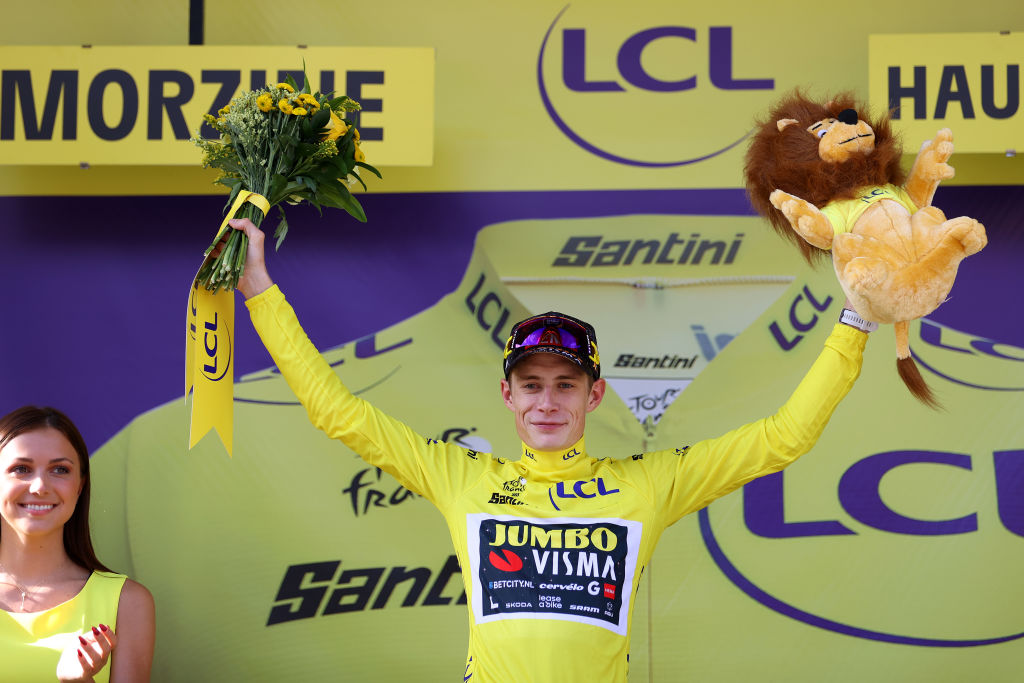
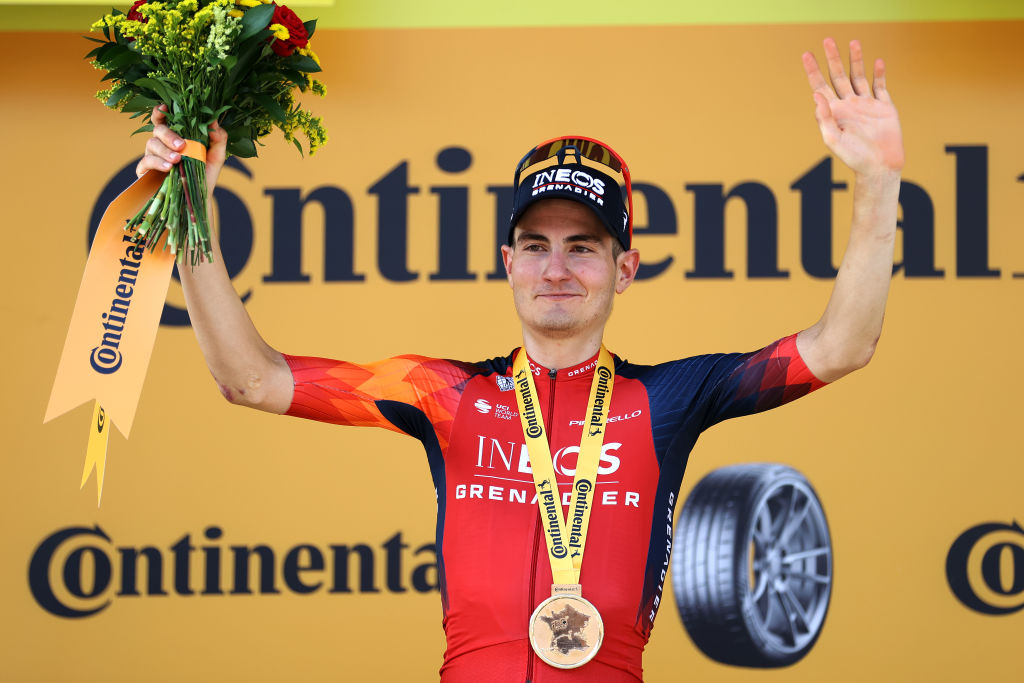
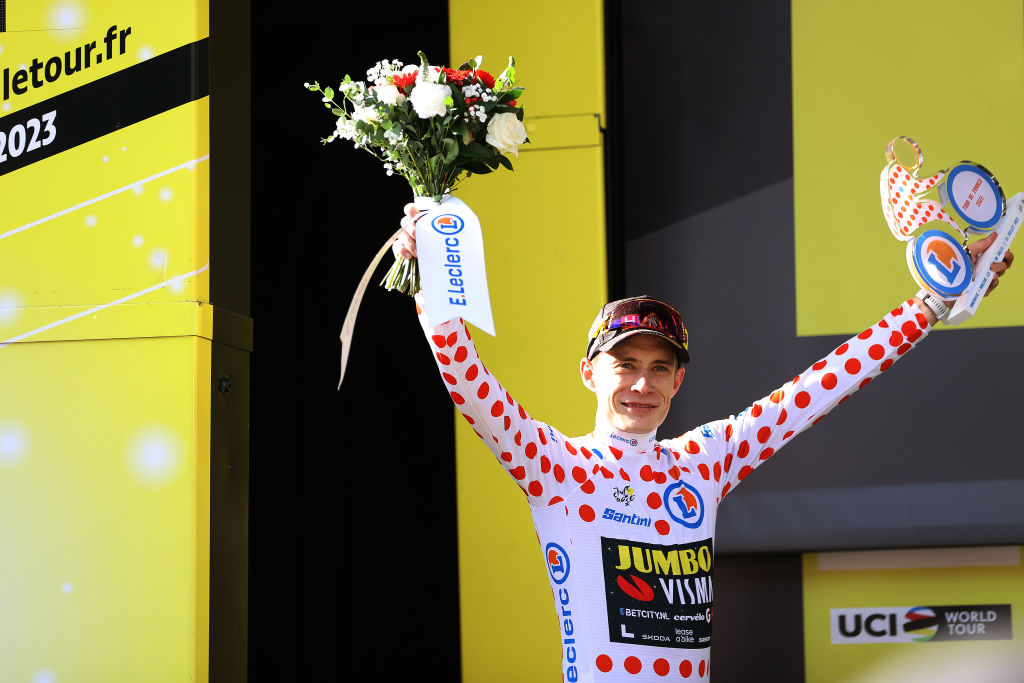
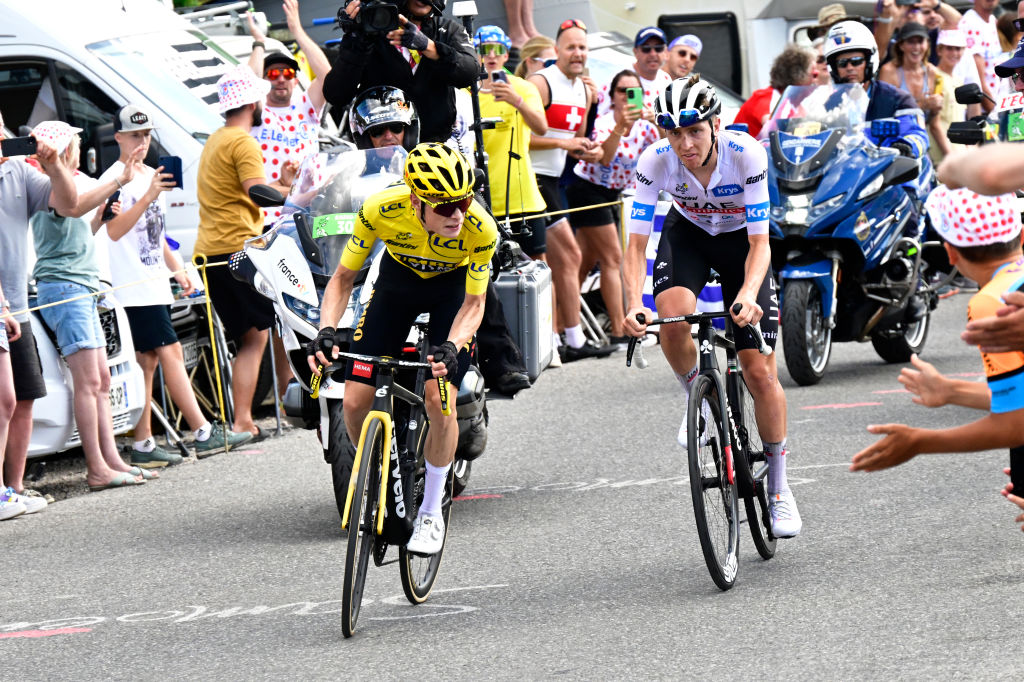
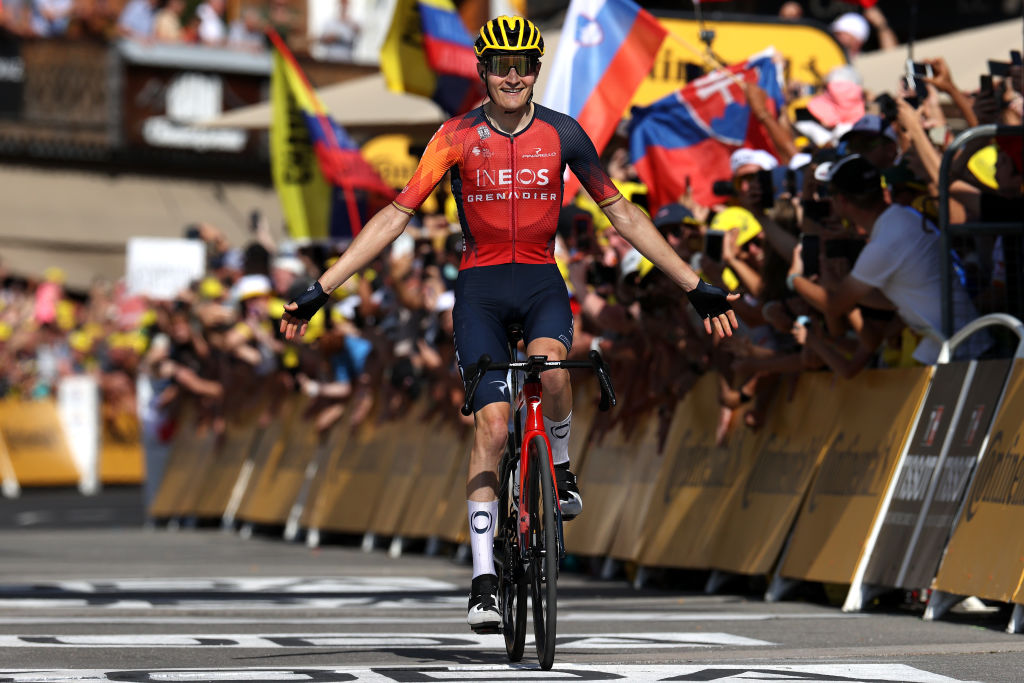
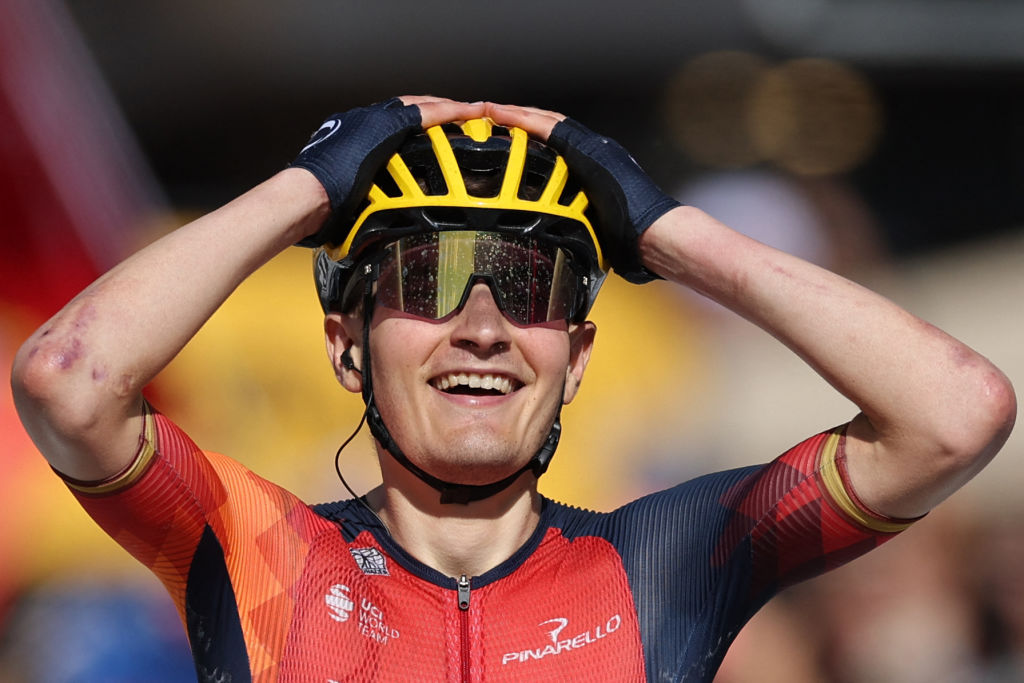
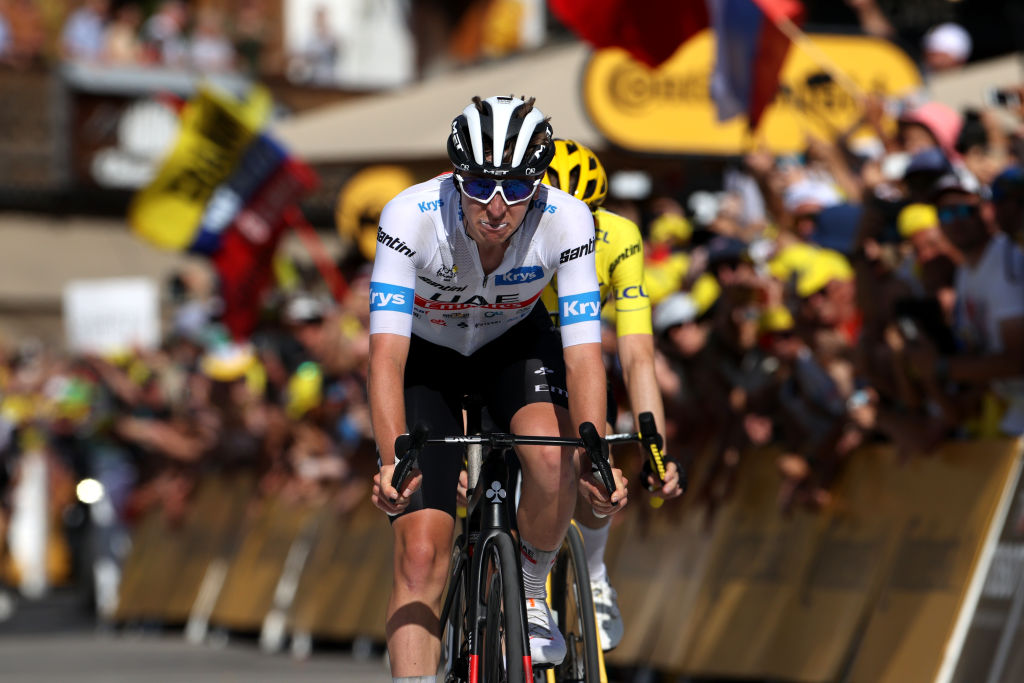
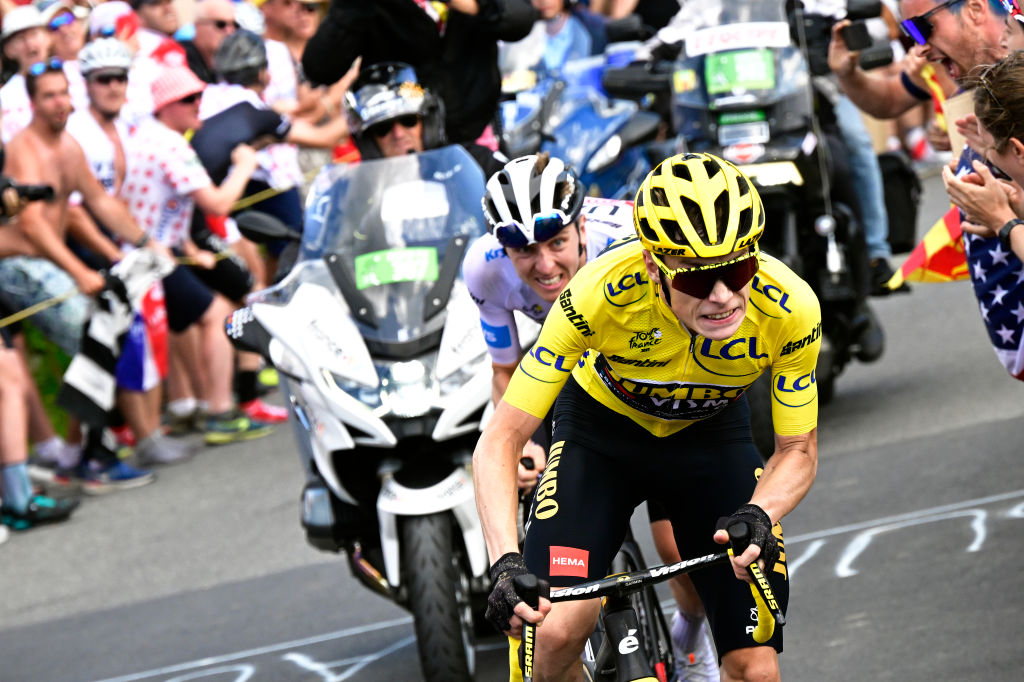
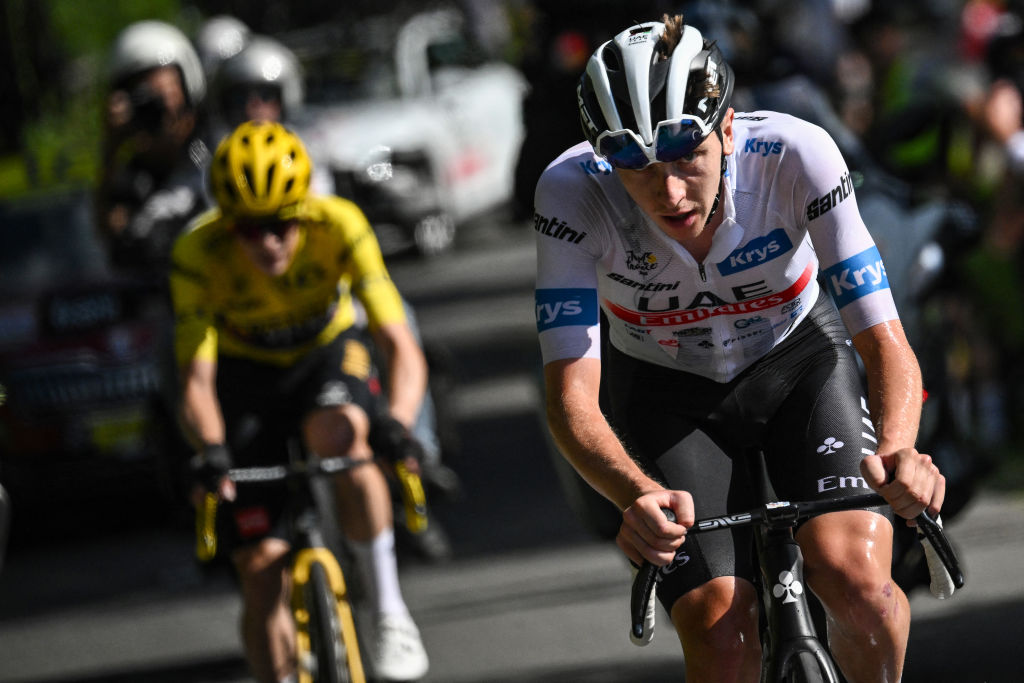
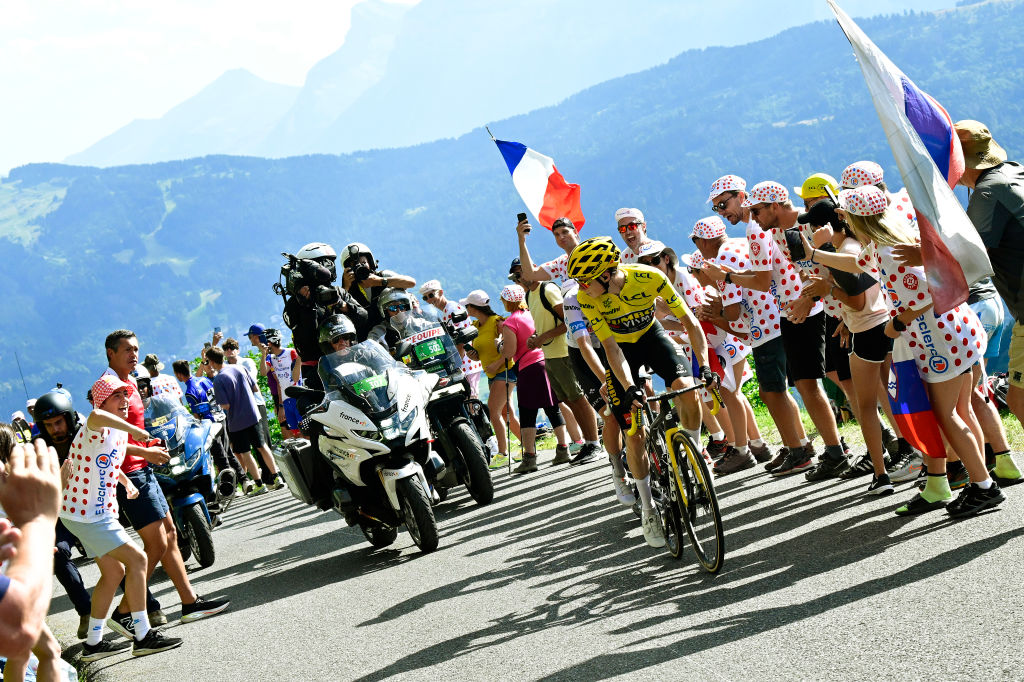
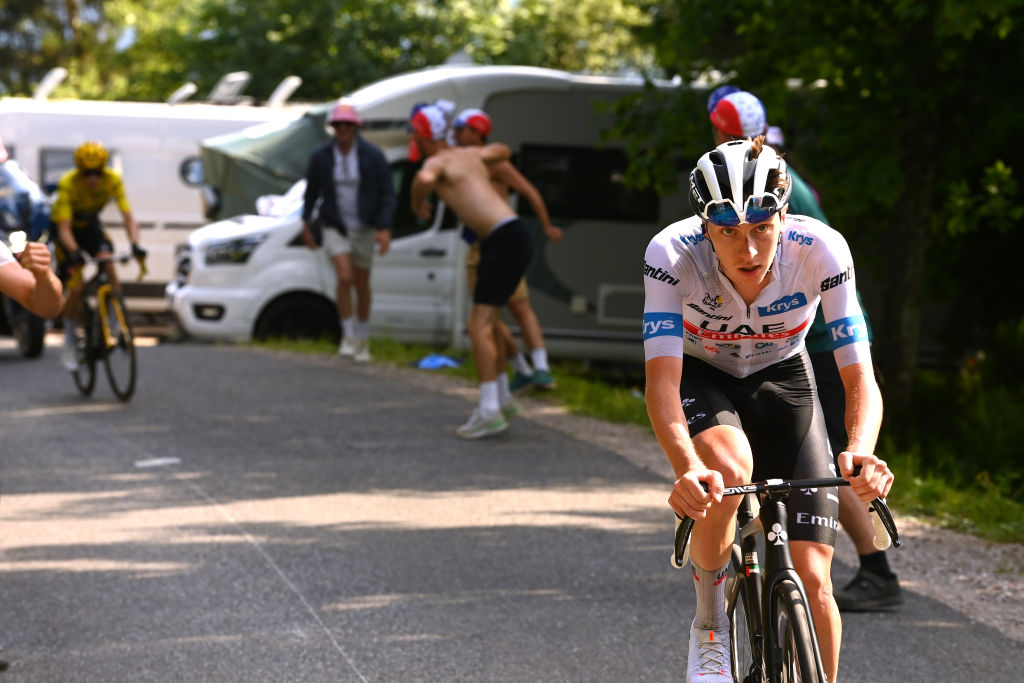
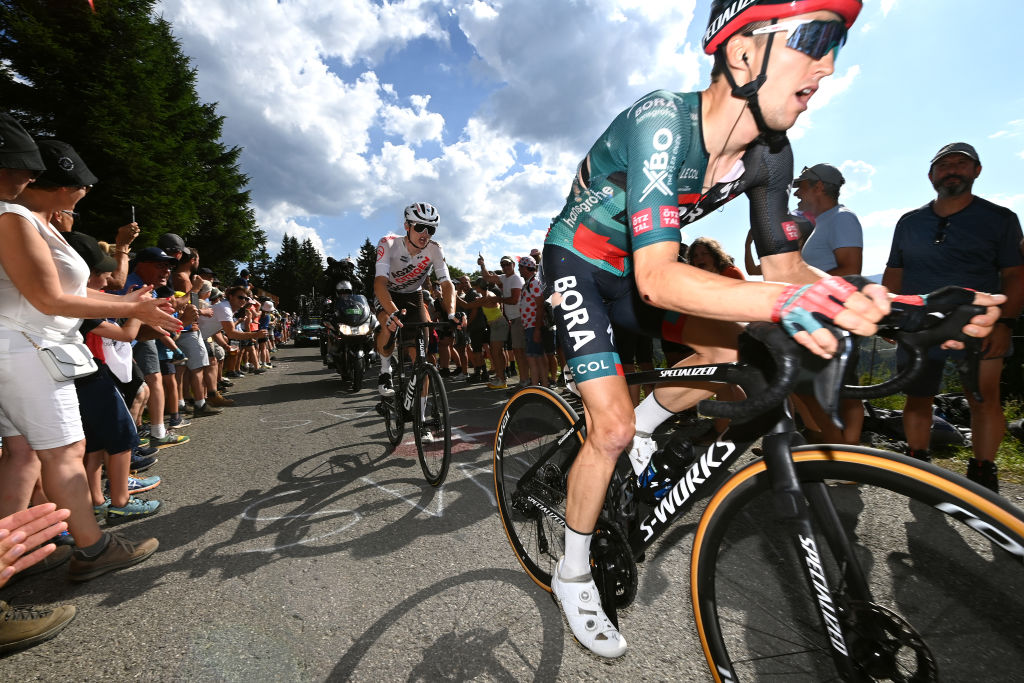
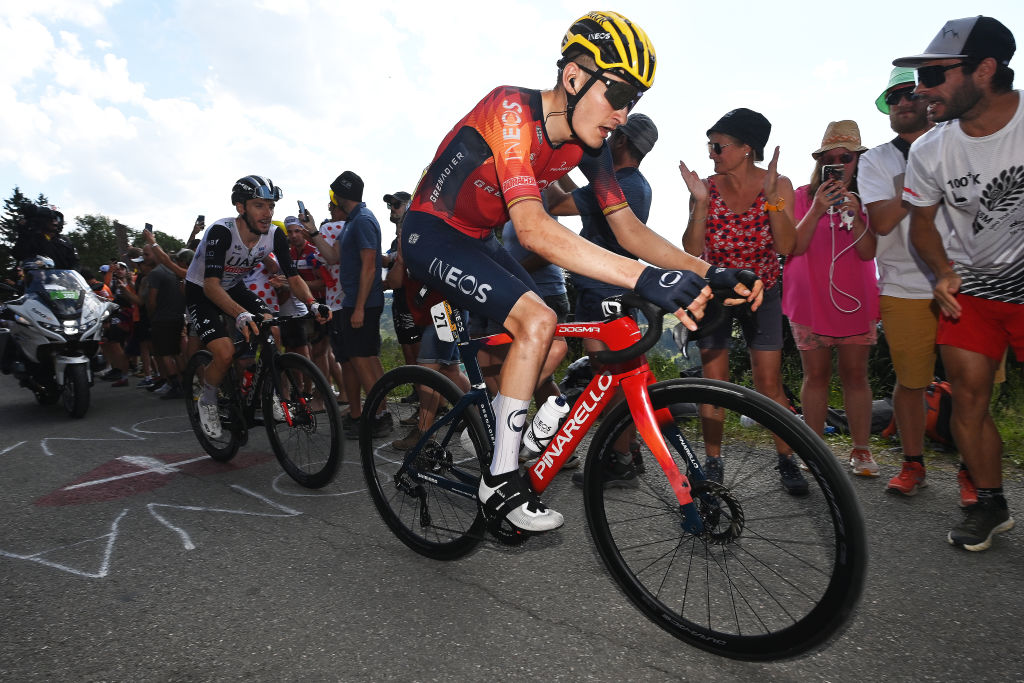
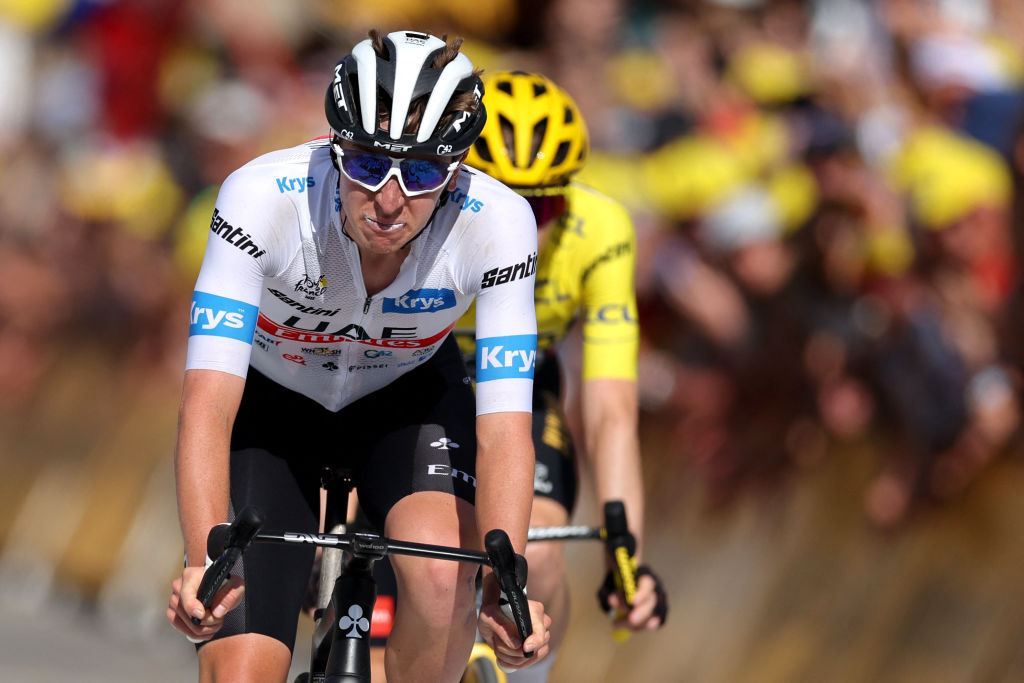
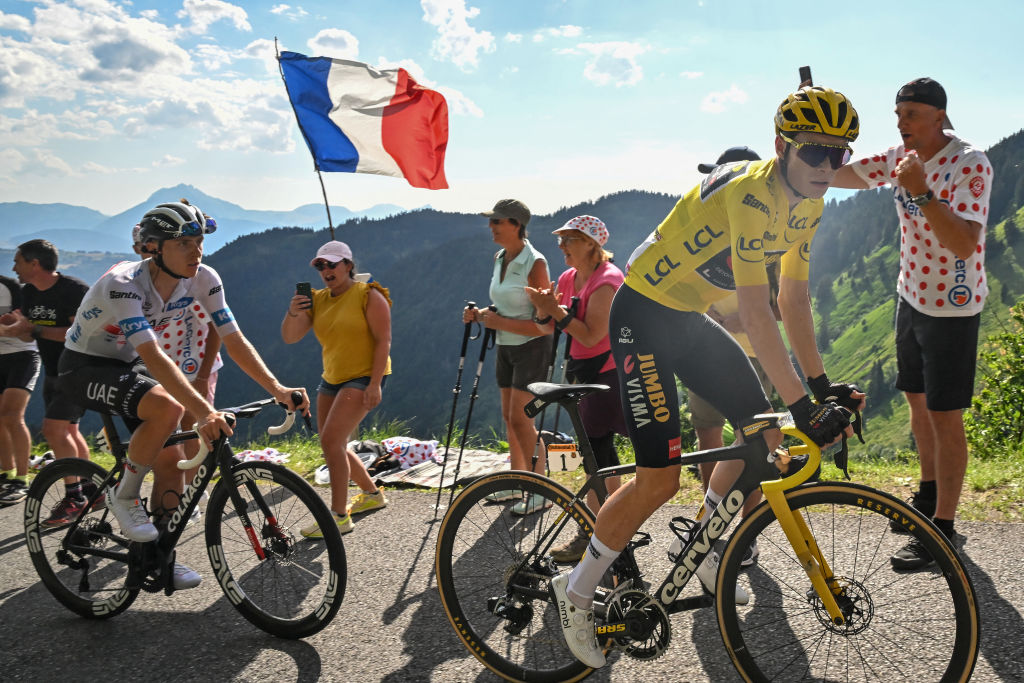
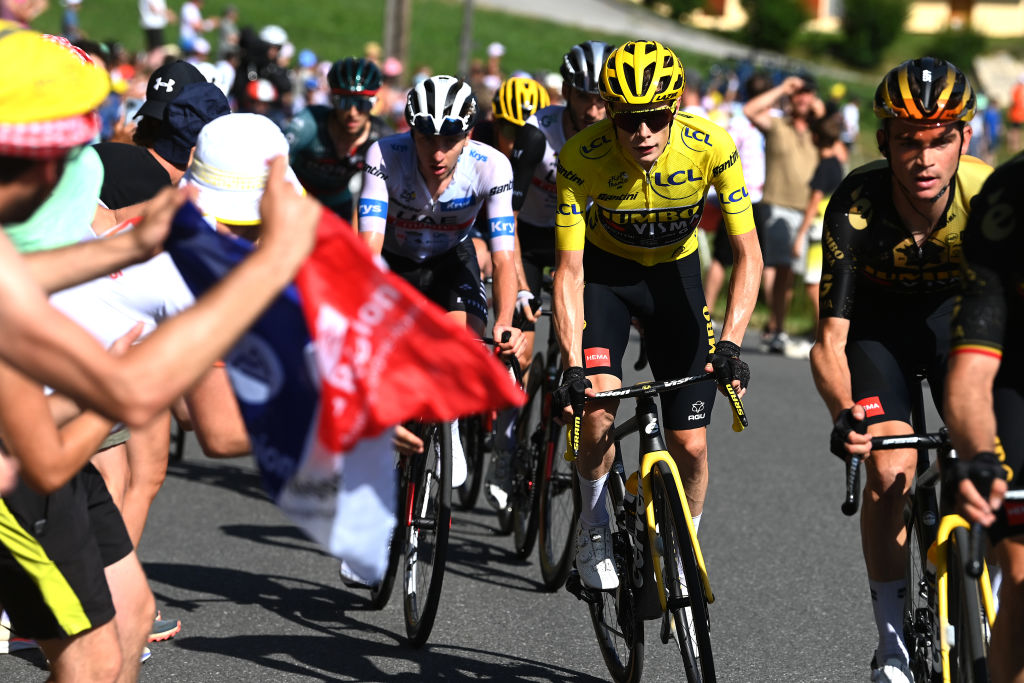
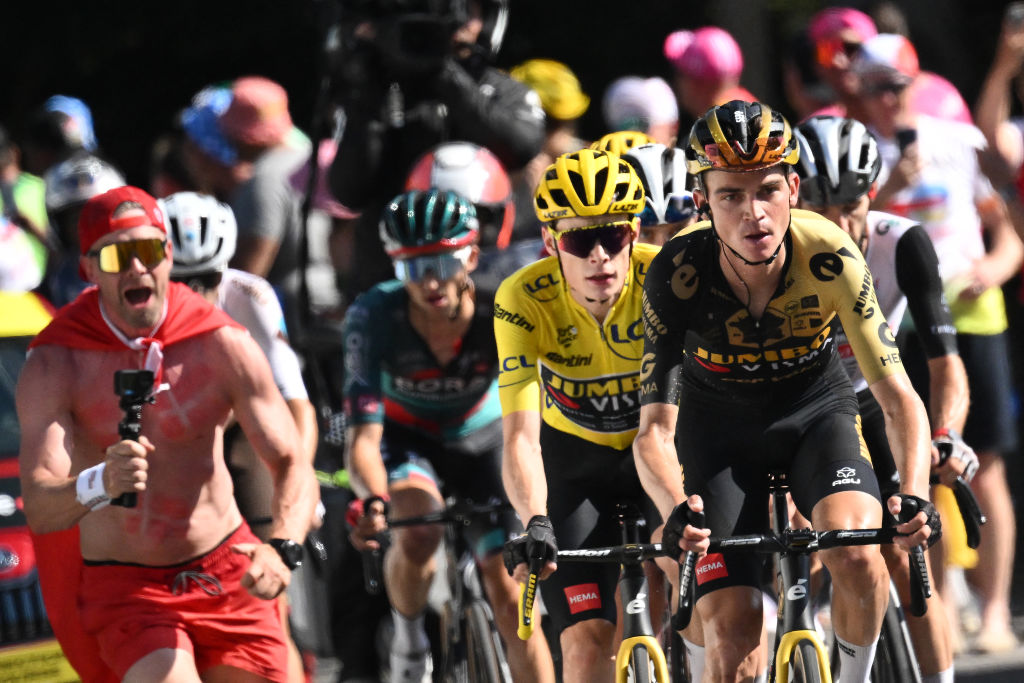
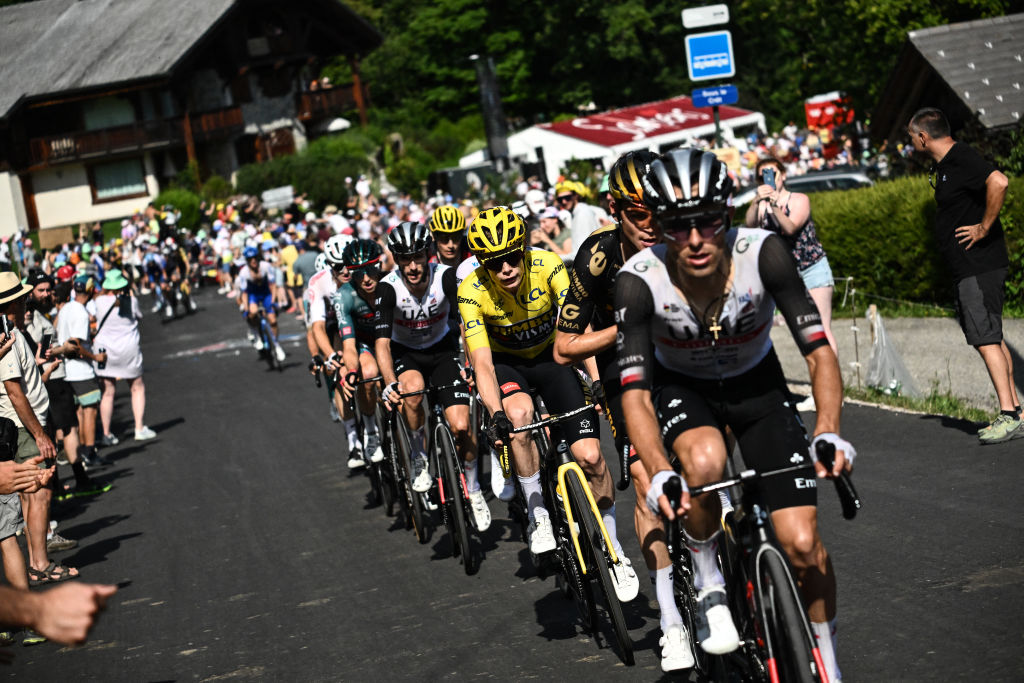
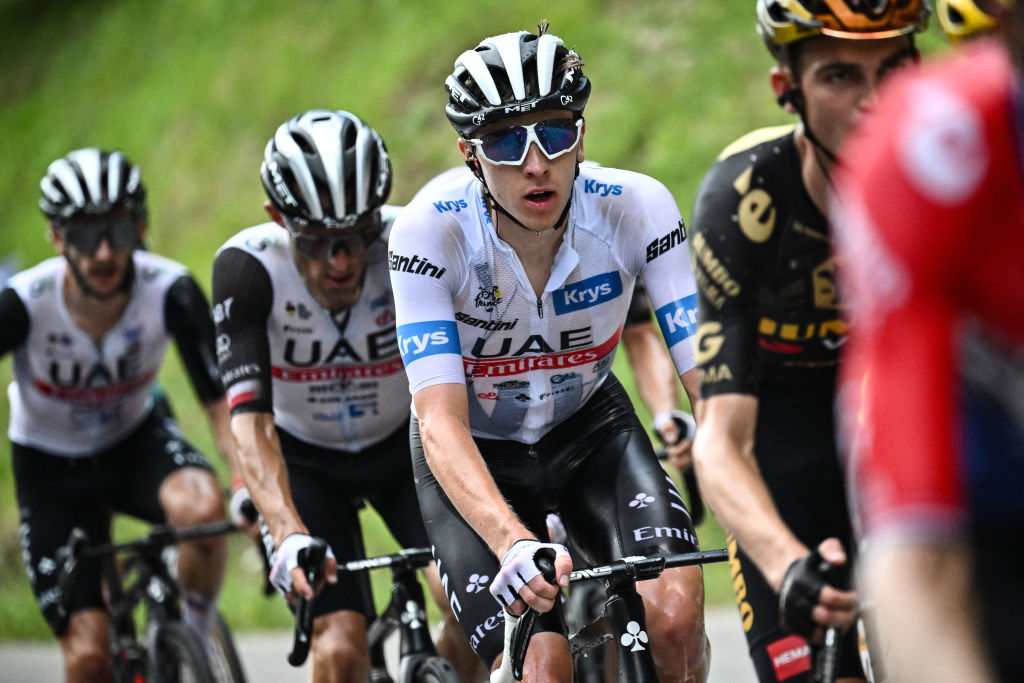
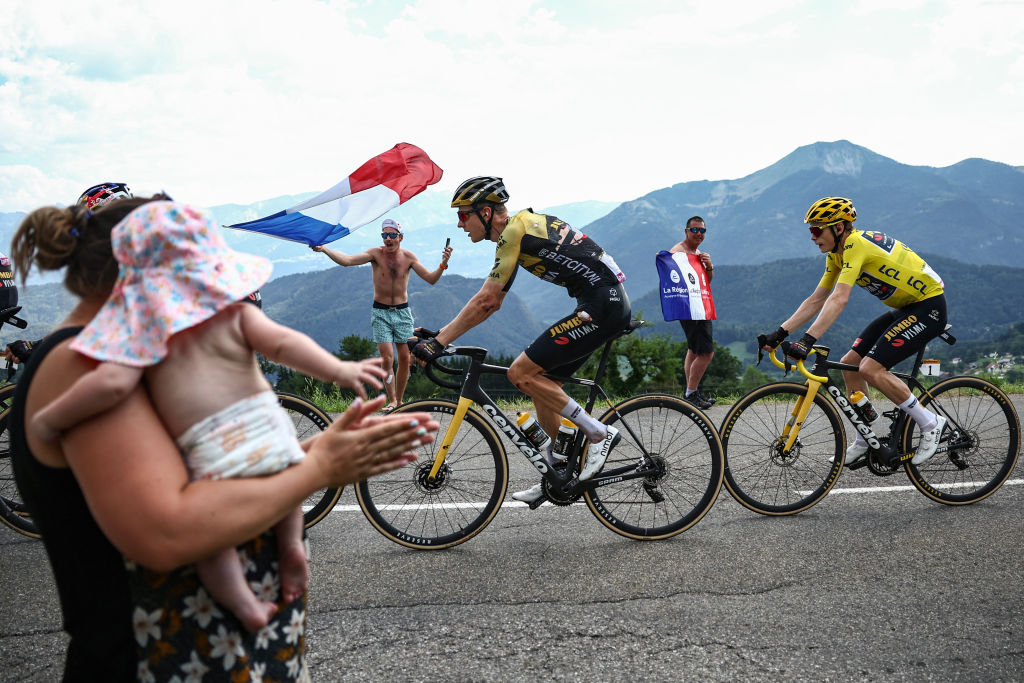
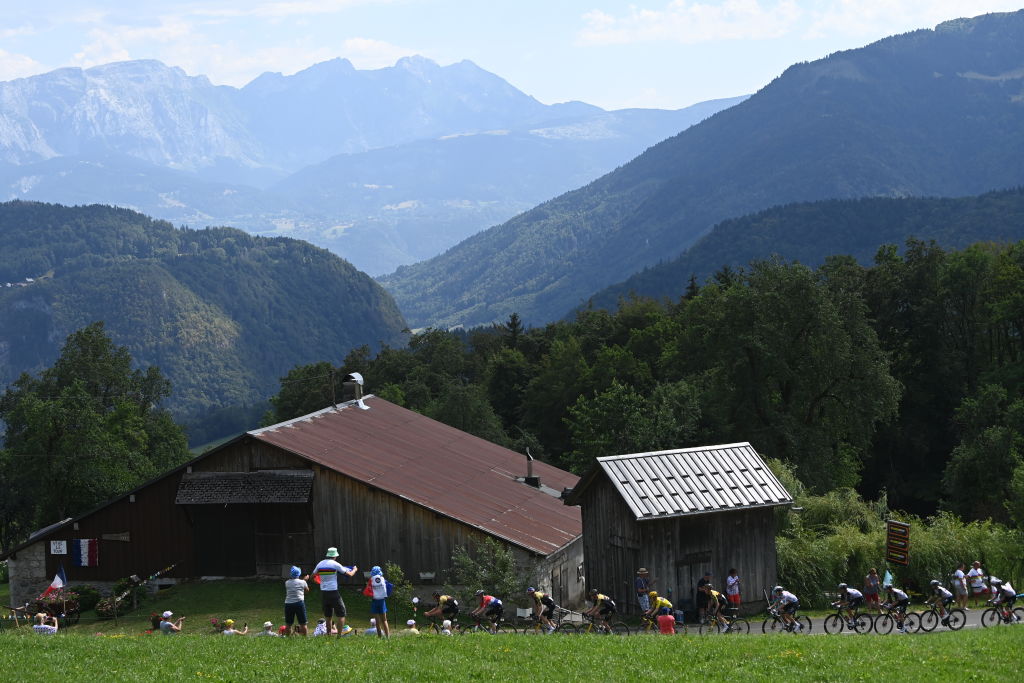
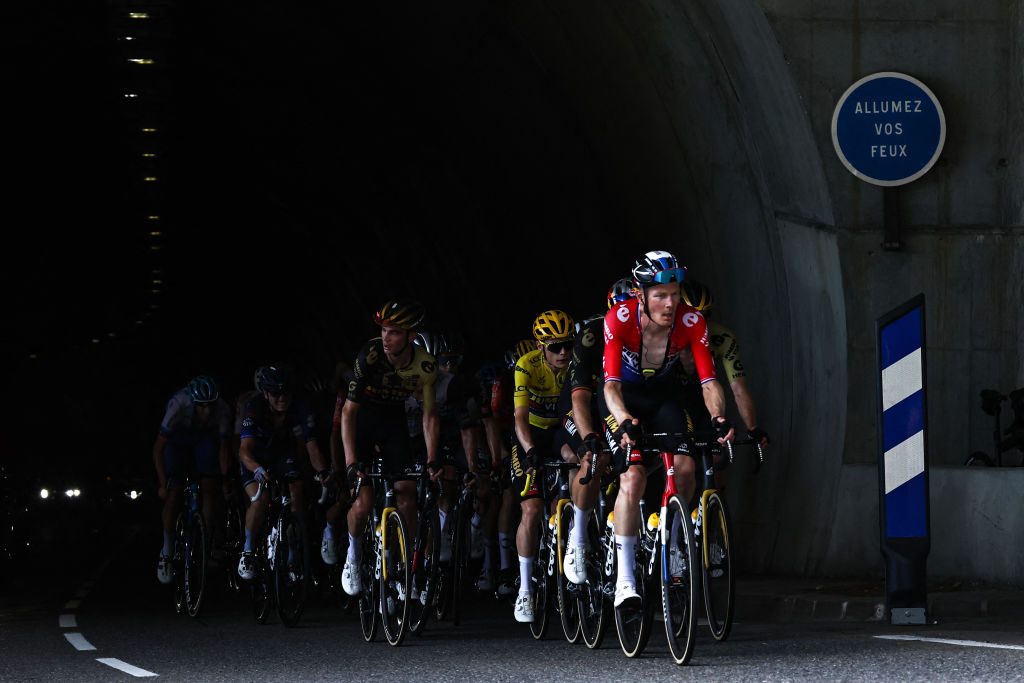
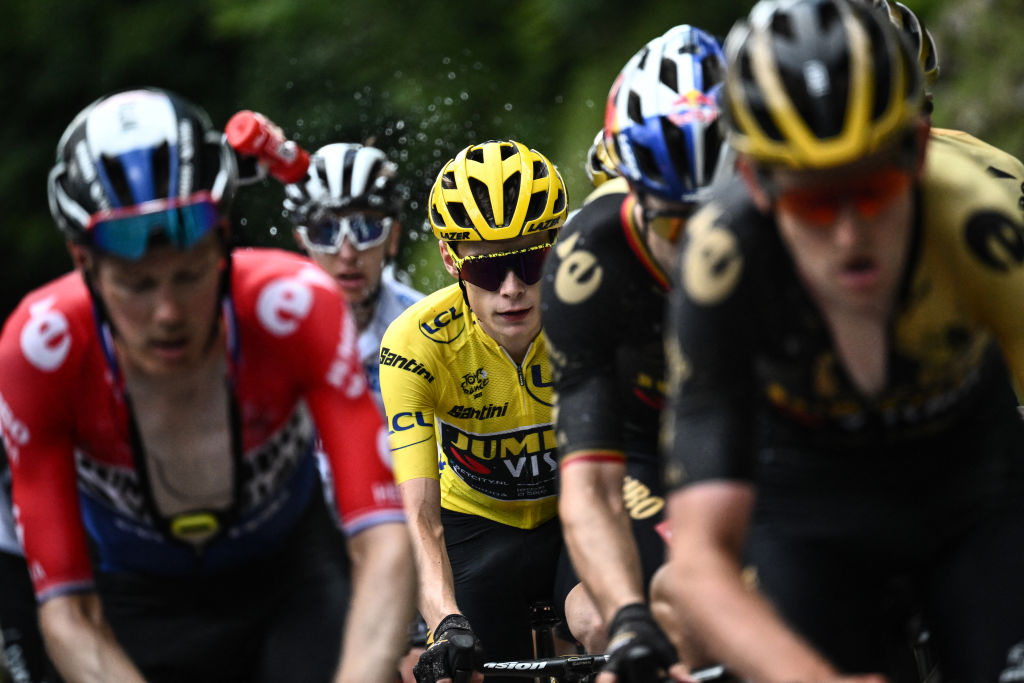
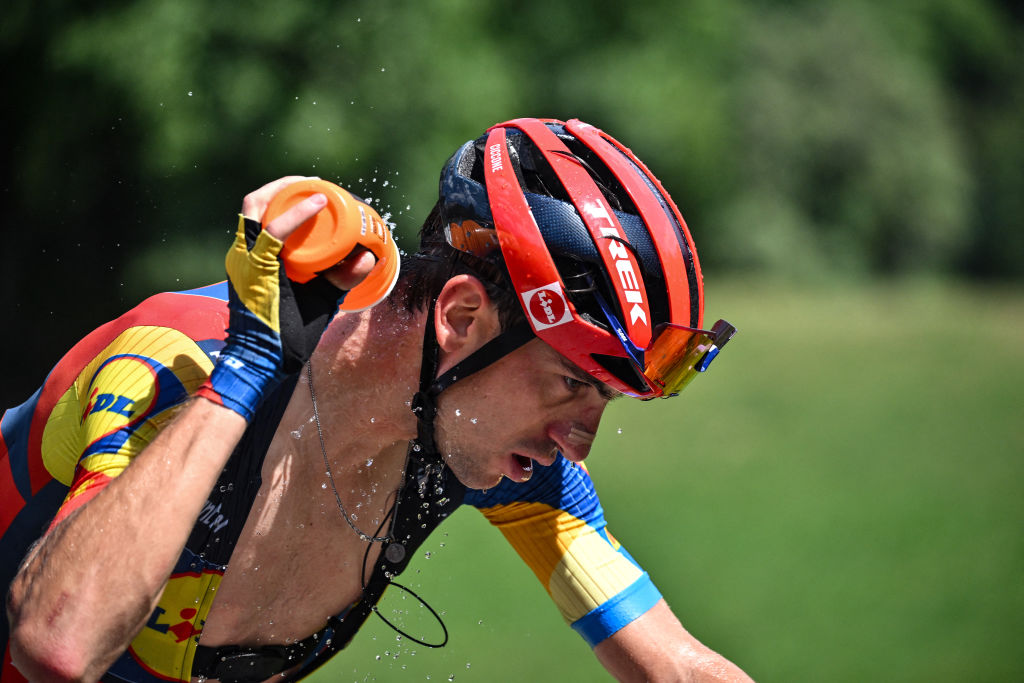
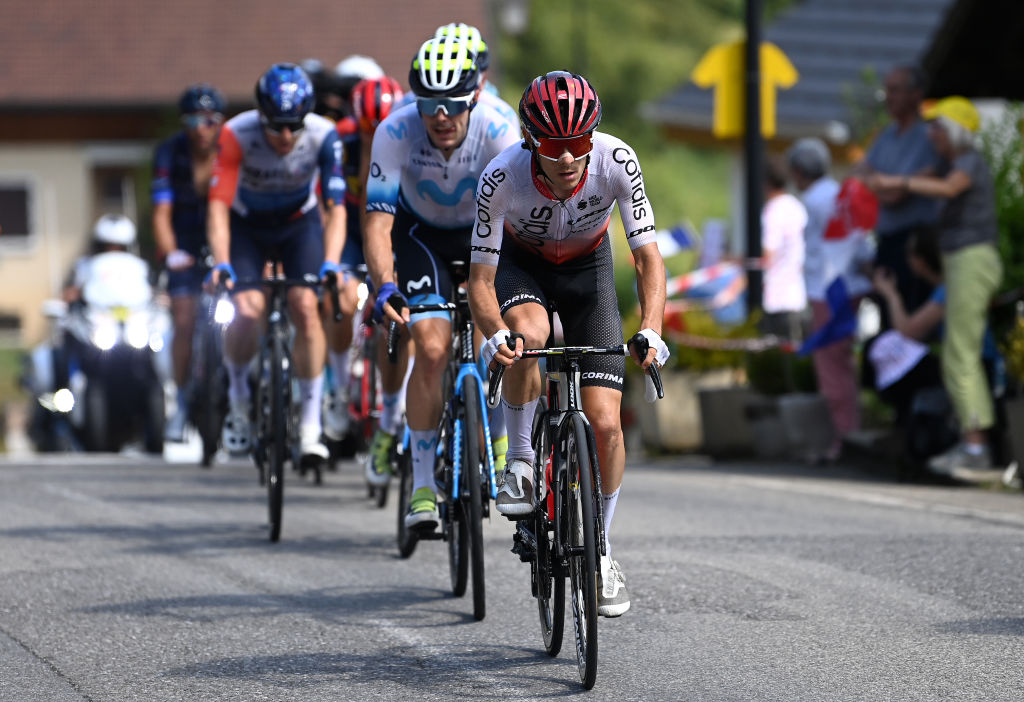
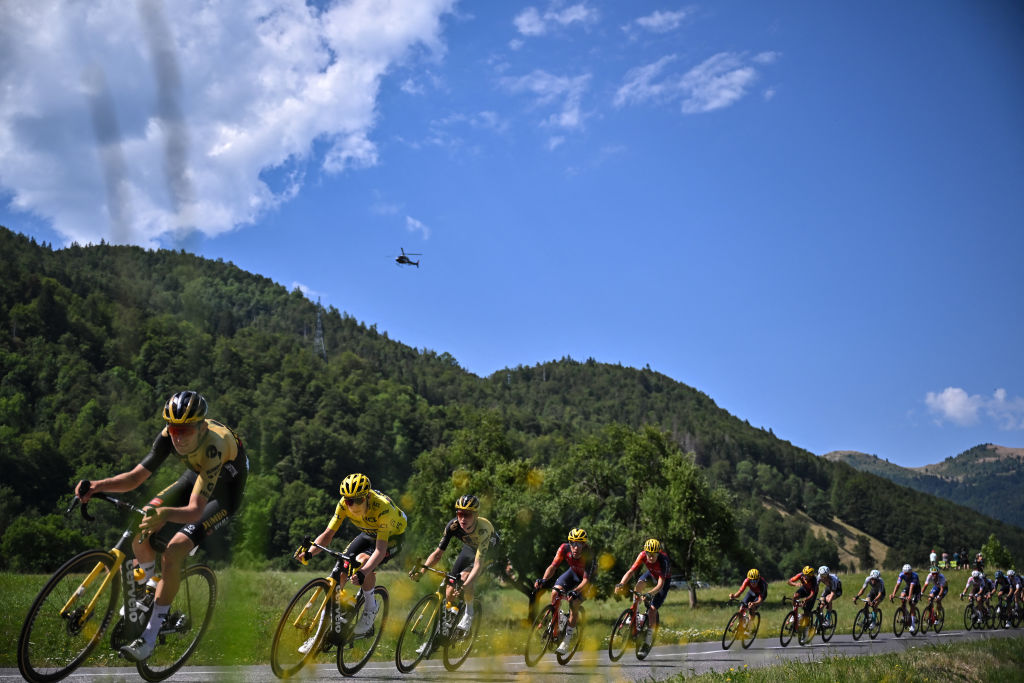
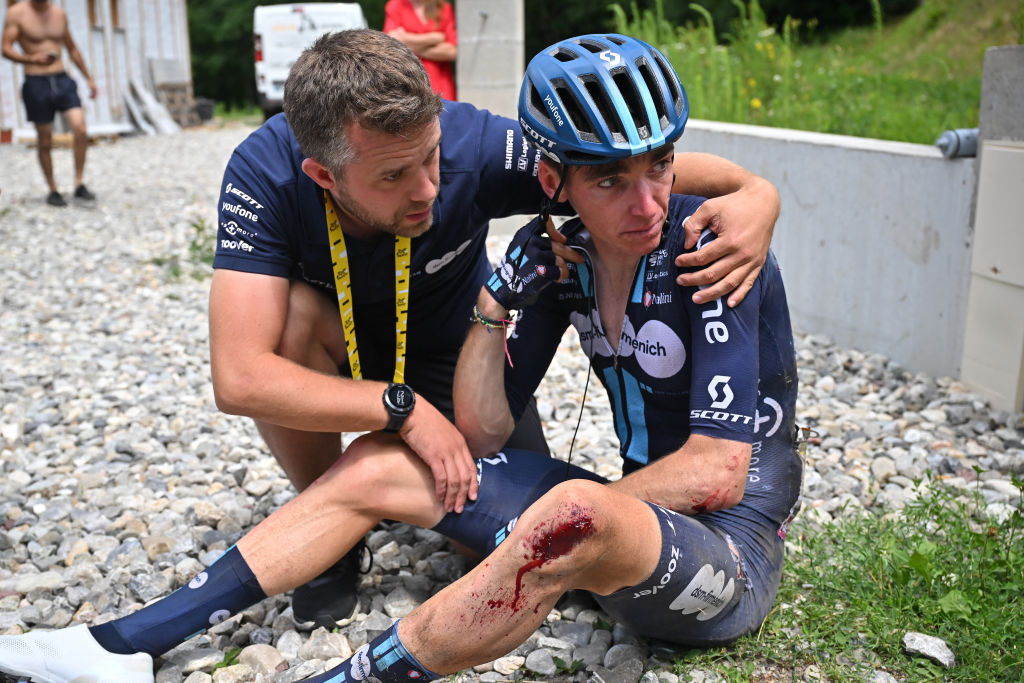
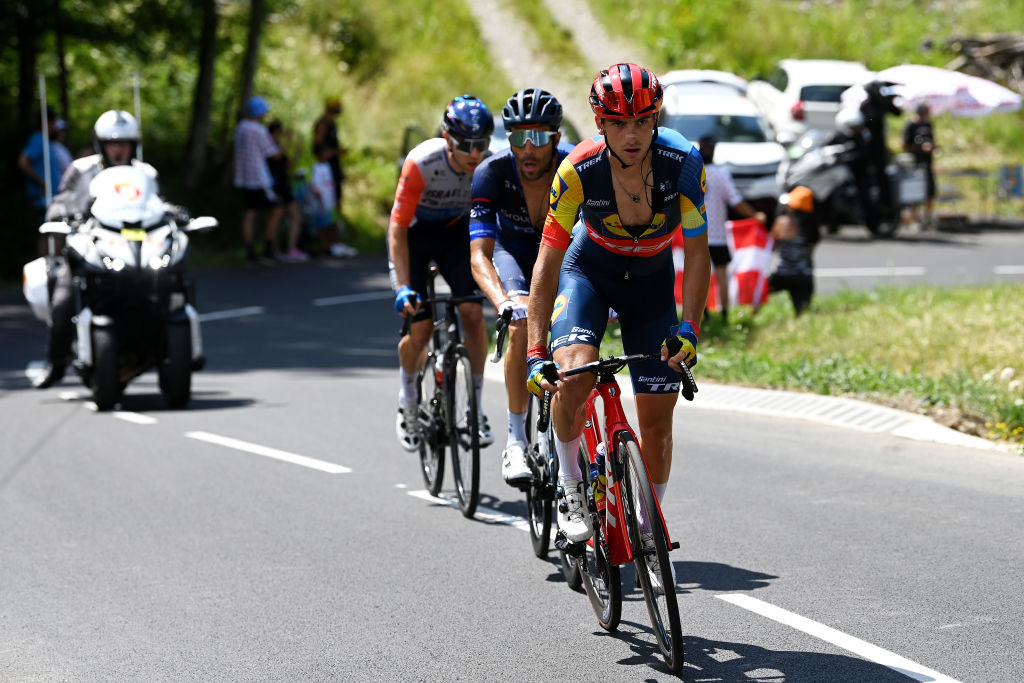
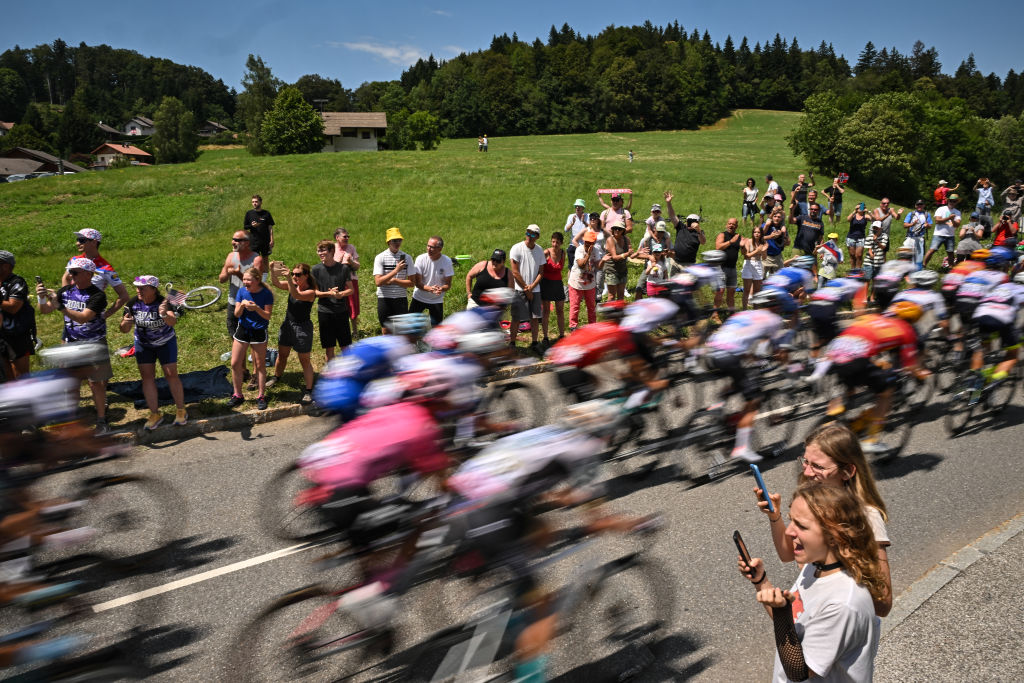

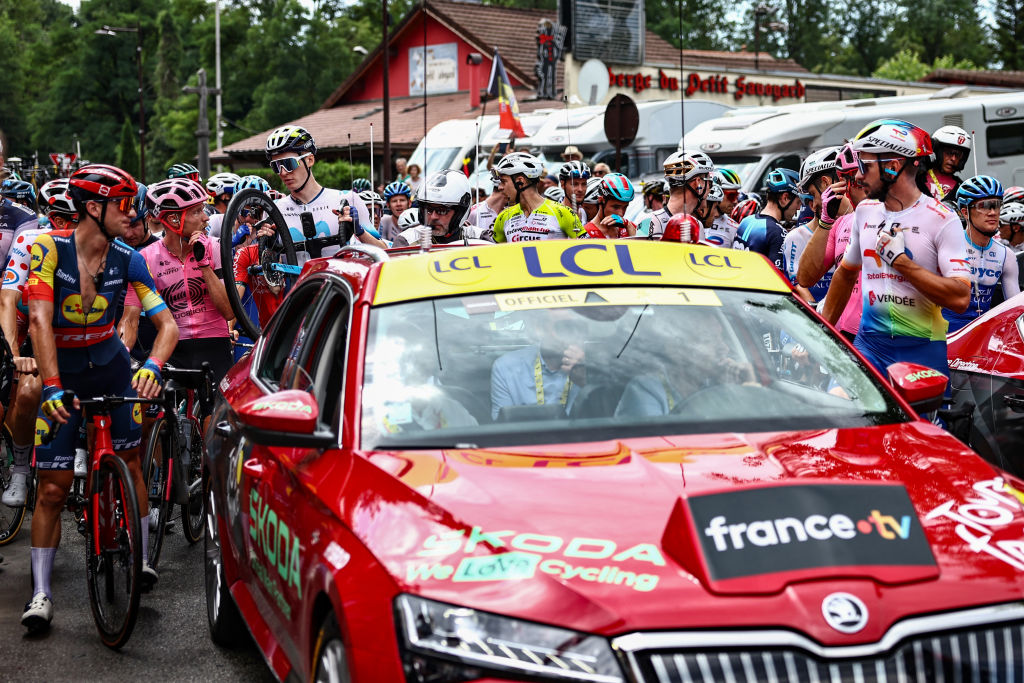
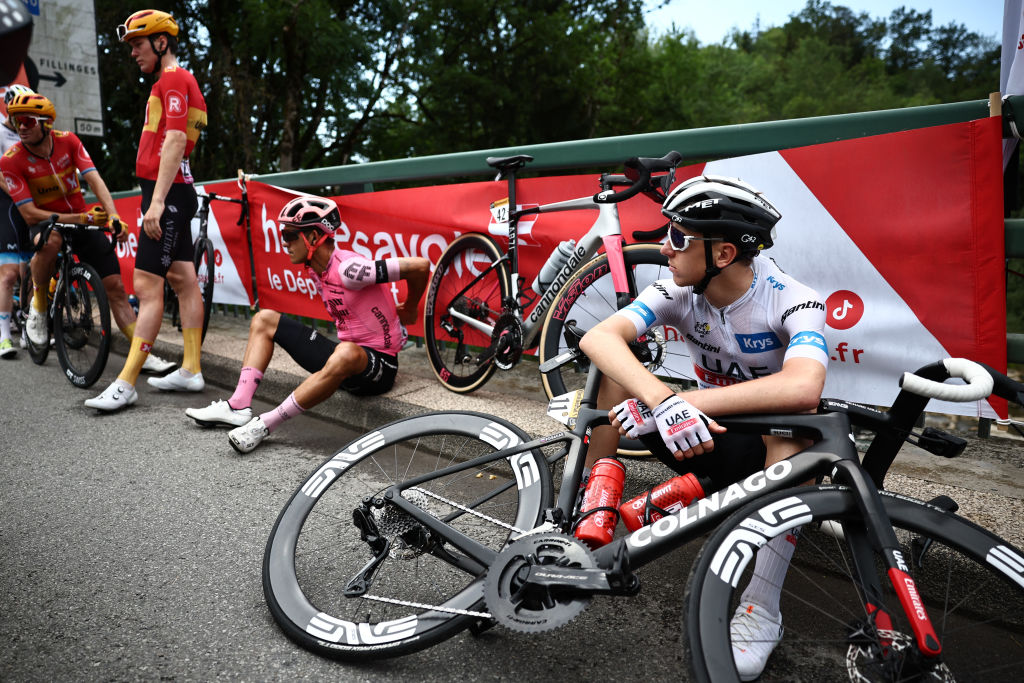
The Col de Joux Plane played host to a titanic battle between Jonas Vingegaard (Jumbo-Visma) and Tadej Pogačar (UAE Team Emirates) on stage 14 of the Tour de France, with the Dane coming out on top to the tune of a second thanks to bonus seconds accumulated on the road to Morzine.
Pogačar led his Danish rival home for second place on the stage behind solo winner Carlos Rodríguez (Ineos Grenadiers) but shed three bonus seconds in the sprint on top of the Joux Plane, and falls to 10 seconds behind in the GC, despite gaining two seconds at the line.
The two barely separable rivals were once again the strongest riders in the peloton on the road uphill, leaving the fight for the maillot jaune still finely poised heading into another brutal mountain test at Saint-Gervais Mont-Blanc on Sunday.
Jumbo-Visma had controlled the stage all day long, with the breakaway barely getting more than a minute up the road before they were caught over 60km from the line on the Col de la Ramaz.
It was all for the finale, the HC-rated, Col de Joux Plane, the culmination of a brutal day in the saddle, with Jumbo-Visma pushing the pace up until Adam Yates (UAE Team Emirates) took over 16km out for Pogačar to launch shortly afterwards.
What was an elite group of seven shrunk to three, then two, then a one-on-one battle between Pogačar and Vingegaard, the Slovenian holding a few seconds’ gap for two kilometres towards the top of the Joux Plane. Vingegaard came back through, prompting cat-and-mouse games ahead of the bonus second sprint at the top.
Pogačar went first 500 metres from the top before being forced to stop by two motorbikes, before Vingegaard caught him unawares 150 metres out to grab three bonus seconds. The descent to the line saw the pair head to Morzine together, with Pogačar having the pace at the line to take second place and with it two of those three seconds back.
Five seconds up the road, Rodríguez crossed the line alone to celebrate the biggest win of his career. The Spaniard had taken advantage of the mind games between the lead duo at the top of the climb and on the descent to get back on before blowing by on the way down.
He maintained a small gap all the way into Morzine, pushing the limits along the way and holding his advantage in order to celebrates a famous stage win.
“It’s incredible. I have no words,” Rodríguez said after the stage. “Being here was a dream and getting a victory is incredible in the best race in the world. It’s something I’ve always wanted to achieve and now I have a victory so I’m super happy. I’m super grateful to the team for believing in me.
“I focussed on doing the best climb I could, going at my own rhythm, and then doing the descent as fast as possible. They started looking at each other, and I thought I’ll go full gas to the finish. I can descend well so I wanted to take advantage of it. I took some risks without wanting to go to the absolute limit because I didn’t want to crash. I was close in a couple of corners, but I’m super happy with this victory.
“It was the goal of today to gain some time and we accomplished it. I just have to be happy and enjoy this victory. Now to think about recovery for tomorrow – it’s going to be a big day also.”
With his win and the 10 bonus seconds, the Spaniard now jumps into third place overall, edging out Jai Hindley (Bora-Hansgrohe) by a single second, 4:43 down on Vingegaard. The Australian trailed home in sixth at 1:46 down.
Fourth-placed Adam Yates (UAE Team Emirates) was 10 seconds down on Rodríguez at the line but now lies within just 37 seconds of the podium, in what should be a spicy three-way fight in the final week.
The biggest – and smallest – movement, however, came at the top of the standings as Vingegaard eked out another second to extend his advantage on Pogačar to 10 seconds. The pair – and those remaining in the Tour de France peloton after a crash-hit day – will now prepare to do battle once again on Sunday’s stage 15, another Alpine day.
“I think today was a good day. I increased my lead, only by one second, I’m still in the yellow jersey and I’m enjoying every day I have in it,” Vingegaard said after the stage.
“We wanted to make the race hard, so that’s what we did. I want to thank my team again, because they were amazing today. All of them were really incredible.
“I super happy to take the three seconds there [Joux Plane]. Then he beat me on the finish line, but in the end I took one second and I can be happy with that.”
How it unfolded
Stage 14 of the Tour de France promised to pack much into its short 151.km length across five categorised climbs, and there was action – and chaos from the off as the peloton left Annemasse.
Just a handful of kilometres into the stage, as tentative attacks began to flow at the front of the peloton, disaster struck on a sweeping bend as a mass crash saw around 20 riders hit the ground and many more held up.
The first big pile up of the 2023 Tour saw the race neutralised as all in-race ambulances were engaged tending to injured riders. Antonio Pedrero (Movistar) and Louis Meintjes (Intermarché-Circus-Wanty) were both forced out of the race as a result of the crash, while Esteban Chaves (EF Education-EasyPost) had to abandon shortly after the race restarted following a half-hour stoppage.
Attacks for the breakaway flew as soon as the flag dropped for a second time and the riders hit the day’s first climb, the third-category Col de Saxel. Julian Alaphilippe (Soudal-QuickStep) was among the riders on the move, with other notable names coming across including Dani Martínez (Ineos Grenadiers) and Alexey Lutsenko (Astana Qazaqstan).
There would be more carnage – and more abandons – as both Romain Bardet (Team dsm-firmenich) and James Shaw (EF Education-EasyPost) crashed out of the race.
Up front, more men got away from the peloton, with mountain classification leader Neilson Powless (EF Education-EasyPost) joined by Giulio Ciccone (Lidl-Trek), Bahrain Victorious duo Wout Poels and Mikel Landa, and Ineos Grenadiers pair Michał Kwiatkowski and Dani Martínez.
The gap to the peloton, controlled by Jumbo-Visma, was still small at just 30 seconds, however, enabling more riders to jump across. Thibaut Pinot (Groupama-FDJ) did so, as did Michael Woods (Israel-Premier Tech). Eventually, a breakaway group of 20 or so riders formed, though the situation changed almost metre by metre.
The first-category Col de Cou (7km at 7.4%) saw Ciccone grab 10 points at the top ahead of Powless and Alaphilippe, while on the next climb of the Col de Feu (5.8km at 7.8%), the attacks began once again.
This time, it was Woods, Ciccone, Landa, Pinot and Alex Aranburu (Movistar), who jumped from the front of the break, with Woods and Ciccone powering clear to contest the points at the top.
The Italian duly sprinted clear to take another 10 points and move to within 12 of Powless’ polka dot jersey. Back in the peloton, meanwhile, the pace had slowed a touch to let the gap go out to 1:20 heading into the last 100km of the day.
The day’s next climb – the 6km, 3% Col de Jambaz – was not in fact a classified climb but instead a ride to the day’s intermediate sprint. Even so, Jumbo-Visma dialled the pace back up, swallowing up riders from the breakaway as the peloton closed to within 20 seconds of the 12-man lead group – Ciccone, Woods, Pinot, Poels, Martínez, Landa and Lutsenko, as well as Gorka Izagirre, Alex Aranburu (Movistar) Tobias Halland Johannessen (Uno-X), Hugo Houle (Israel-Premier Tech), and Guillaume Martin (Cofidis).
Things calmed down on the long descent from the Jambaz, with over 20km to run until the start of the first-category Col de la Ramaz (13.9km at 7.1%). There was little change in the race situation as Jumbo-Visma knocked off the pace to let the break start the climb with an advantage of 45 seconds.
The Ramaz and Joux Plane
The first kilometre of the Ramaz – 64km from the finish – saw the peloton speed up once more to move to within 30 seconds of the break. Once again, it was Ciccone and Woods who responded at the front by going clear together.
Soon enough, they’d be out front alone as Jumbo-Visma led the peloton up to the rest of the break at 61km to go with Nathan Van Hooydonck setting the pace for the Dutch squad.
Two kilometres later, it was over for Woods too as Tiesj Benoot swept him up. Ciccone punched out on his own, but he too was caught after another kilometre of racing – no more breakaway.
The peloton slimmed and slimmed on the way up the Ramaz, leaving just 20 men by the time Dylan van Baarle took over for Benoot. His 2km stint on the front saw Tom Pidcock (Ineos Grenadiers) in trouble at the back, with the Briton losing touch along with Emanuel Buchmann (Bora-Hansgrohe) as Wout van Aert took up the pacemaking 2km from the top.
Pidcock wouldn’t make it back by the top, crossing the summit at 25 seconds down. He surprisingly even lost time on the way down, too as Jumbo-Visma kept pushing.
The Dutch squad also spat Simon Yates (Jayco-AlUla) out the back as Van Aert led the way down. It would take 10km of chasing onto the valley road with teammate Chris Harper – plus Martin and Felix Gall (AG2R Citroën) – before Yates would get back. His countryman Pidcock, meanwhile, was well out of it and nearing two minutes down heading into the final 30km.
The final, HC-rated climb of the Col de Joux Plane (11.6km at 8.5%) was the final – and the toughest – difficulty of the day. Van Aert and Wilco Kelderman led the way onto the lower slopes, but Rafał Majka (UAE Team Emirates) was quick to take over, shedding the pair of them as well as Martin, Simon Yates, Pello Bilbao (Bahrain Victorious), and David Gaudu (Groupama-FDJ).
Van Aert sensationally made it back a kilometre into the climb, riding up the group and taking Majka’s spot, while Bilbao and Yates fought to get back. The Belgian put in one last monster effort before Sepp Kuss took over the lead of the seven-man group 21km out, 9km from the top.
He led six others – Vingegaard, Pogačar, Adam Yates, Hindley, Rodríguez, and Gall – up the climb as Simon Yates, Bilbao, and Gaudu dropped further and further back. The leading septet continued together until the 17.5km to go mark, 5.5km from the top, at which point Gall dropped, with Hindley losing touch 200 metres later.
Kuss would continue for another 800 metres before Adam Yates took over and upped the pace again, dropping the American and Rodríguez and leaving three up front. At 15.5km to go, a kilometre later, Yates peeled off and Pogačar made his move.
Vingegaard couldn’t respond immediately, though held the gap at a handful of seconds, not ceding major ground but not getting back across, either. The pair rode along, holding the gap, for 2km before Vingegaard got back and went to the front after some cat-and-mouse slowing down between them.
The Dane unfailingly kept watch over his shoulder for signs of a move from his great rival, one which finally came 500 metres from the line at the top of the climb. It was an abortive move though, with the narrow strip of tarmac available blocked by two motorbikes. Now on the front for the final metres of the mountain, Pogačar wasn’t as attentive and let Vingegaard blast by to claim a valuable eight bonus seconds to his five.
While the attacks, mind games, and slowing down happened up front, Rodríguez was steadily working his way back, coming across with Adam Yates on the way down towards Morzine.
The Spaniard immediately sensed an opportunity, hit the front, and then disappeared into the distance – off to claim his stage win after a faultless descent. A few seconds further back, Pogačar led Vingegaard for much of the way before Yates took over in Morzine for the final lead out. There, Pogačar struck back for second and six bonus seconds to Vingegaard’s four – more vital time in what is turning into a herculean GC battle.
Results
Results powered by FirstCycling







